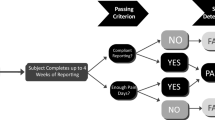Abstract
Background
Missed research appointments may bias the outcome of prospective clinical trials if the participants that miss appointments differ in important ways from those that do not. The purpose of this study was to determine the predictors of missed research appointments in patients enrolled in clinical trials.
Methods
We retrospectively evaluated 665 participants enrolled in ten prospective clinical trials conducted at our outpatient office between 2001 and 2010. Demographic data (sex, race, date of birth, date of enrollment, age at enrollment, educational level, and work status), study coordinator, and study type were analyzed for association with missed a research appointment in bivariate and multiple logistic regression analyses.
Results
One hundred and forty-four (21.7 %) participants missed research appointments during their follow-up. There were no statistical differences between those who missed appointments and those who did not, regarding sex, race, and age at enrollment. Educational level and work status were independent predictors of missed appointments.
Conclusions
This study suggests that educational level and work status are predictors of missed appointments in prospective clinical research.
Similar content being viewed by others
References
Claus RE, Kindleberger LR, Dugan MC. Predictors of attrition in a longitudinal study of substance abusers. J Psychoactive Drugs. 2002;34(1):69–74.
de Graaf R, Bijl RV, Smit F, et al. Psychiatric and sociodemographic predictors of attrition in a longitudinal study: The Netherlands Mental Health Survey and Incidence Study (NEMESIS). Am J Epidemiol. 2000;152:1039–47.
Neuner B, Fleming M, Born R, et al. Predictors of loss to follow-up in young patients with minor trauma after screening and written intervention for alcohol in an urban emergency department. J Stud Alcohol Drugs. 2007;68(1):133–40.
Pelisse M, Barasso R. The follow-up of anogenital warts in a specialized consultation: study of patients lost to follow-up. Ann Dermatol Venereol. 2003;130(11):1003–7.
Thomas MC, Walker M, Lennon LT, et al. Non-attendance at re-examination 20 years after screening in the British Regional Heart Study. J Public Health Med. 2002;24:285–91.
van Amelsvoort LG, Beurskens AJ, Kant I, Swaen GM. The effect of non-random loss to follow-up on group means estimates in a longitudinal study. Eur J Epidemiol. 2004;19:15–23.
Acknowledgments
No funds were received in support of this study.
Author information
Authors and Affiliations
Corresponding author
About this article
Cite this article
Ootes, D., Buijze, G.A. & Ring, D. Predictors of missed appointments in prospective hand surgery research. HAND 7, 177–180 (2012). https://doi.org/10.1007/s11552-012-9411-7
Published:
Issue Date:
DOI: https://doi.org/10.1007/s11552-012-9411-7



